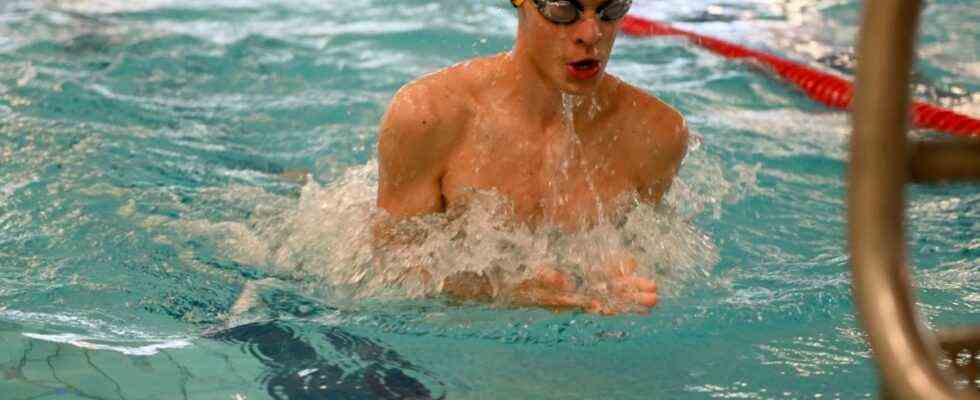By L. Gavarini, K. Kobl, P. Meggendorfer and J. Moravek
Jonathan Frenkel was out of the water for seven months. Before Corona, he regularly took part in competitions at the Wasserfreunde swimming club in Maxvorstadt. He has been training several times a week since he was eight years old. Sport is more than just a hobby for him. But in the past few months, the 15-year-old was not allowed to pull a lane for the first time in his life. Like almost 10,000 swimmers in Munich. Because during the lockdown this was only allowed to professional athletes. Now Frenkel has to find the connection again.
After the first lockdown, the rules were relaxed in the summer holidays last year, swimmers could now at least individually in the water in the Olympic pool. In autumn, Jonathan Frenkel trained again for a few weeks in the school swimming pools, where children usually learn to swim. Then it was completely closed again.
But not all athletes had to do without. A small group was allowed to continue: the squad swimmers, i.e. the professionals. There are only 66 athletes in Munich in total. They were even better off than ever before, explains Bastian Esefeld from the Bavarian Swimming Association: “They didn’t have to share the halls with anyone and were able to train much more often.” No one else was allowed into the water. It was particularly difficult to cope with for those athletes who had failed just before the squad and therefore lost a whole year of training. “Of course they say that they will never have a chance to get to this select group again,” says Esefeld.
Frenkel, too, had almost made it into the squad. In April he was frustrated with the situation: “It’s just unfair that the others are allowed to swim and we are not.” In order to stay in shape anyway, he moved a lot during the pandemic winter. He did dry training, that’s what the club calls it. Instead of rowing his arms through the air, he did jumping jacks and strength exercises, squats, push-ups and sit-ups, guided by the swimming coach via video conference, for one and a half hours, five days a week. This strengthens the muscles that are needed to swim. But the courses did not come close to the physical exertion of six to seven kilometers of lanes. And it wasn’t fun either: “It doesn’t replace swimming,” says Frenkel.
After seven months of dry runs, Frenkel has been back in the hall six times a week since the beginning of June. It will be difficult to make up the difference in performance compared to professional swimmers. Frenkel also noticed at the beginning that he was lagging behind. “It seems logical to me that everyone who was on the verge of competitive sport lost touch,” says Leopold Beer, youth manager of the Wasserfreunde swimming club. The young people will need until the summer vacation to reach the level of the last few years. “There have been gaps, especially in terms of technology,” says Beer.
Everyone is a bit more optimistic now. Frenkel himself is already seeing progress: “It’s easy to get back in.” This is also due to the club’s coaches, who attach great importance to ensuring that the young people come to training regularly. They support Frenkel and his fellow swimmers as well as the professionals.
Although Frenkel is happy about that, he sees the differences to the swimmers in the squad: “You can tell during training that the others are faster.” However, this has no influence on the cohesion in the team.
“Club sport has a high social component,” says Matthias Marckhoff, sports medicine specialist at the Münster University Hospital. “It is a great field of experimentation for personal development: competition, arguments, learning to lose.” But Frenkel says that it’s not primarily about the competitions – but about having fun in the sport. And about the contact with his fellow swimmers. He especially missed him during the corona-related break: “We often talk after training or go to the cinema together.”
It was precisely this sense of community that motivated him to get back into swimming training. A few months ago, Frenkel wasn’t sure whether he would start again. At that time he thought that he would no longer enjoy the sport if he was slower than the others. When he was not swimming, he concentrated on his other hobby: playing the saxophone. Frenkel is still trying to practice an hour a day. If he still has time for it in addition to training. Because when he was swimming, his ambition grabbed him again. “Competitive swimmers are all used to biting through, not being put off. They are now training harder than ever,” says Leopold Beer, speaking of an unbelievable euphoria.
In the first competition after the break, Frenkel has the chance to prove himself. Only swimmers compete who have not yet made it into the roster. After the competition, 60 new places will be allocated. Jonathan Frenkel is hoping for one of them.

